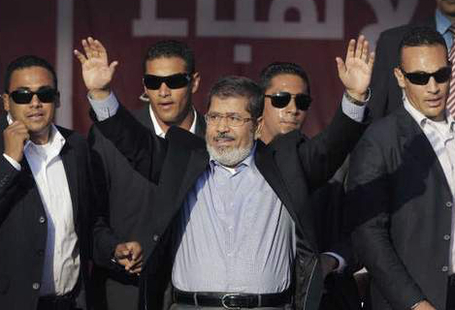We should not engage the Brotherhood on any level. With any luck their "Renaissance Project" will quickly fall apart, exposing the mythology of their Islamist doctrine in short order.
Once the economic situation deteriorates to a certain point, Egyptians will evict the Brotherhood. Morsi is already screwing up the books and throwing around money that doesn't exist (just like Obummer).
Once the economic situation deteriorates to a certain point, Egyptians will evict the Brotherhood. Morsi is already screwing up the books and throwing around money that doesn't exist (just like Obummer).
(Detriot Free Press) - The victories of Islamic parties in Egypt and elsewhere have forced the U.S. to embark on an untested strategy to engage with groups that have historically been hostile to American interests, analysts said.
"From a U.S. perspective, we have no choice but to deal with the Muslim Brotherhood," said Shadi Hamid, an analyst at the Brookings Doha Center. "I don't see what the alternative is."
In the latest triumph for Islamic groups, Mohammed Morsi of the Muslim Brotherhood was elected president in Egypt last month. Islamist groups have also emerged strong in Tunisia, where the government is led by the Islamic party Ennahda, and Libya.
Although the U.S. has had good relations with regimes where political Islam is prevalent, such as Saudi Arabia, its policy toward Islamic groups that are ousting long-standing regimes or pressuring them to change is evolving.
"There's been a sea change in U.S. policy toward the Brotherhood," said James Phillips, an analyst at the Heritage Foundation.
Analysts are divided over whether the Obama administration's policy is a risk that will backfire or represents a pragmatic approach to rapidly changing events in the Arab world. Much depends on how the Muslim Brotherhood is viewed: whether it is a pragmatic organization whose leaders will compromise once in power or a group of extremists who are modifying their rhetoric to disguise their true intentions, analysts said.
The Bush administration viewed it as a "hostile ideological force," Phillips said. The Obama administration believes it can work with the Brotherhood as a political force, he said.
"It certainly has become more accepting of the Brotherhood," said Daniel Serwer, a professor at Johns Hopkins School of Advanced International Studies and a scholar at the Middle East Institute.
The Muslim Brotherhood is a movement that supports political Islam and opposes Western ideals of governance, spawning Islamic movements that range from the moderate in Jordan to violent jihadists such as Hamas in Gaza. Brotherhood members are forming political parties to vie for power as Arab Spring uprisings oust longtime rulers and pressure others to open up democratically.
The administration may feel it has little choice but to deal with elected Brotherhood leaders in Egypt, a country that had been a Middle East ally for years under dictator Hosni Mubarak, analysts said.
White House spokesman Jay Carney has said the Obama administration has "broadened our engagement" with emerging parties in Egypt.
Administration officials have met with Muslim Brotherhood leaders, and Carney said the White House will judge such leaders on how they act. Some question what engagement will bring, especially on matters of importance such as Israel's security and Muslim terrorism.
The Muslim Brotherhood's leadership has said it supports Egypt's international treaties -- the peace treaty with Israel being one -- but some Brotherhood leaders have suggested the treaty should be reviewed.
"They're hostile in the long run to peaceful coexistence with Israel," Phillips said.
It is not clear that a Muslim Brotherhood government in Egypt would cooperate with the U.S. on terrorism. Hamas, which the U.S. and Europe consider a terrorist organization, is an offshoot of the Brotherhood and continues to allow the firing of missiles into Israel.
"It's not going to be business as usual," Hamid said. "They're not going to go along with U.S. objectives and interests as Mubarak did."
The Brotherhood's political agenda has not been made clear. Its platform during the campaign for the parliament and the presidency consisted of calls to elevate Islamic traditions, end corruption and repression and boost the standing of Egypt's impoverished millions.
Related
- Coptic activists march to presidential palace
- "Sharia Harassment" plagues Egyptian woment
- Hamas PM to meet Islamist President of Egypt
- Clinton to meet with Islamofascist President of Egypt
- Egypt: Islamists debate role of Sharia in constitution
- Sec. Clinton Gave Hundreds of Millions to MB
- Al-Qaeda Muslim Brotherhood Coalition
- MB Preaching Destruction of Israel After Election
- Allen West: Arab Spring is Islamic Nightmare
- Christians Should "Convert, Pay Tribute, or Leave,"
- Brotherhood Promises Islamic Law in Egypt
- Female Genital Mutilation: MB’s Gift to Women
- MB Goals: Application of Sharia & Caliphate
- MB Close to Attaining "Ultimate Goal"

